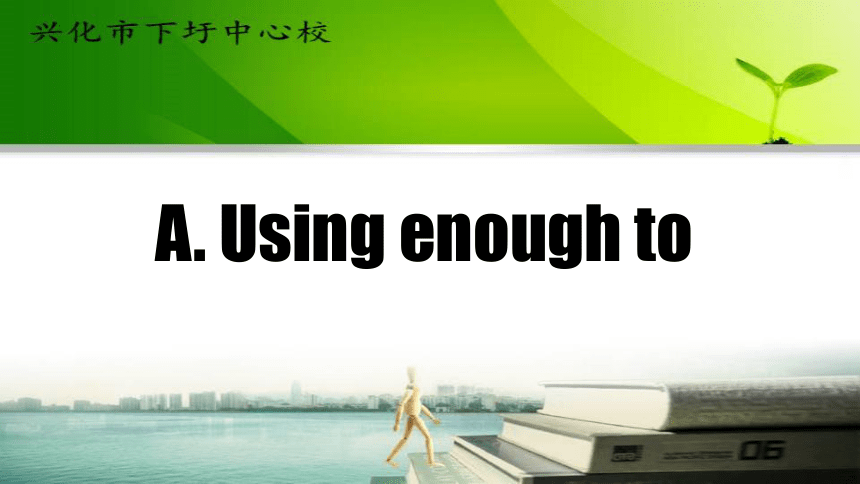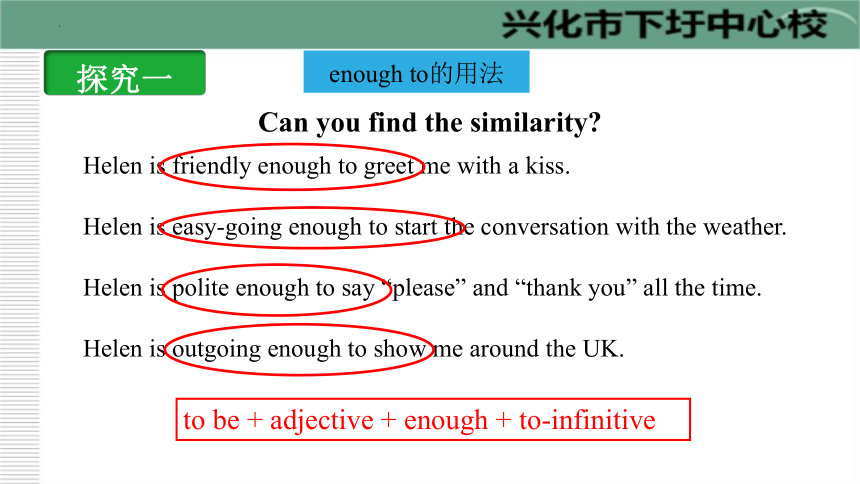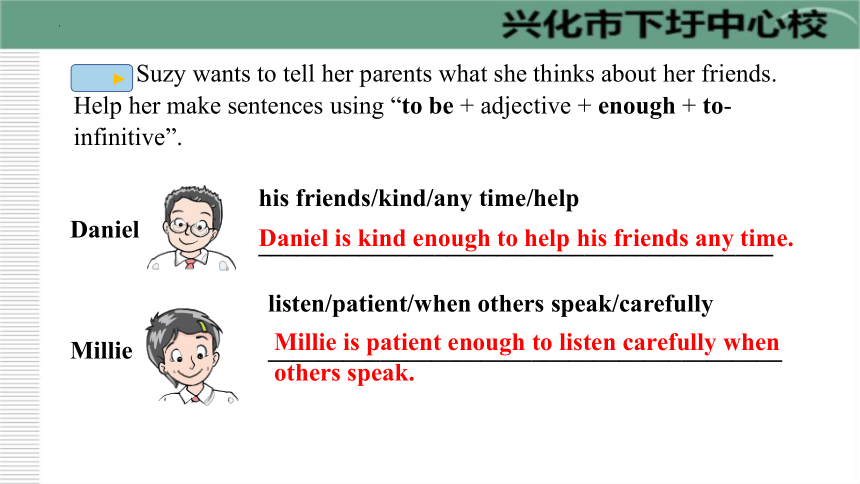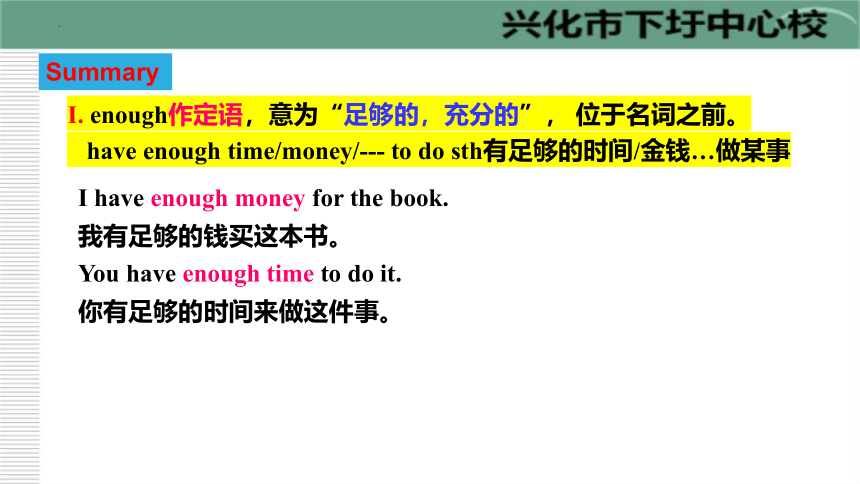Unit 5 Good manners Grammar课件(共27张PPT)
文档属性
| 名称 | Unit 5 Good manners Grammar课件(共27张PPT) |  | |
| 格式 | pptx | ||
| 文件大小 | 1.2MB | ||
| 资源类型 | 教案 | ||
| 版本资源 | 牛津译林版 | ||
| 科目 | 英语 | ||
| 更新时间 | 2024-03-27 10:30:25 | ||
图片预览









文档简介
(共27张PPT)
Good manners
Grammar
Language Goal
1. 能熟悉并正确运用本课时的重点单词和短语。
2. 能掌握enough to的用法。
3. 能掌握too ... to的用法。
A. Using enough to
Helen is outgoing enough to show me around the UK.
Helen is polite enough to say “please” and “thank you” all the time.
Helen is easy-going enough to start the conversation with the weather.
Helen is friendly enough to greet me with a kiss.
enough to的用法
Can you find the similarity
to be + adjective + enough + to-infinitive
探究一
We can use “to be + adjective + enough + to-infinitive” to describe a person's personality and abilities.
You are old enough to learn about manners.
If you're in their way, British people will be polite enough to wait till you move.
Suzy wants to tell her parents what she thinks about her friends. Help her make sentences using “to be + adjective + enough + to-infinitive”.
▲
his friends/kind/any time/help
_________________________________________
Daniel
Millie
listen/patient/when others speak/carefully
_________________________________________
Daniel is kind enough to help his friends any time.
Millie is patient enough to listen carefully when others speak.
Sandy
around her/careful/small changes/notice
_____________________________________________
Kitty
generous/with others/her things/share
_____________________________________________
Simon
queue/polite/in public
_____________________________________________
make everyone laugh/funny/after class
_____________________________________________
Amy
Sandy is careful enough to notice small changes around her.
Kitty is generous enough to share her things with others.
Simon is polite enough to queue in public.
Amy is funny enough to make everyone laugh after class.
Summary
Ⅰ. enough作定语,意为“足够的,充分的”, 位于名词之前。
have enough time/money/--- to do sth有足够的时间/金钱…做某事
I have enough money for the book.
我有足够的钱买这本书。
You have enough time to do it.
你有足够的时间来做这件事。
Ⅱ. enough作状语,意为“充足地,充分地”,修饰形容词或副词,放在形容词或副词之后。
“be + adj. + enough to do sth.”意为“足够……来做某事”
当该结构的主语是指人时,用来描述该人的性格特征及能力 。
当该结构的主语是指事物时,用来描述某事物的特征,此时,enough后通常加“for sb.”
Is this good enough 这个够好吗?
Amy is old enough to wash her own clothes.
艾米够大了,可以自己洗衣服了。
The car is cheap enough for Tom to buy.
这辆车足够便宜,汤姆买得起。
在使用本句型的时候,要注意主语和be动词的一致性。形容词前
没有任何如very,quite等之类的修饰词。
此句型可以和so …that …或者too---to---互换
The room is big enough to hold 20 people.
He is outgoing enough to make friends easily.
= He is so outgoing that he can make friends easily.
他很外向,很容易交朋友。
Eddie is not tall enough to reach the box on the fridge.
=Eddie is too short to reach the box on the fridge.
艾迪很矮,够不到冰箱上的盒子。
Six bottles should be enough.
六瓶应该够了。
Two hours is enough.
两个小时够了。
Ⅲ. enough作表语,意为“足够的”
more than enough “”绰绰有余的,足够多的
1. David is curious. He asks his parents many questions every day.
David is ______ ______ ____ ___ his parents many questions every day.
2. Kitty is clever enough to make all kinds of kites.
Kitty is ___ ______ _____ she____ ____ all kinds of kites.
3. Andy isn’t strong enough to carry the big box.
Andy is ___ ______ ____she______carry the big box.
curious enough to ask
so clever that
can make
一、同义句转换
so weak that can’t
4. It’s very kind of you to tell me this news.
You are _____ ________ to tell me this news.
5. This problem is too difficult for her to work out.
This problem is not _____ ______ _____ _____ _____ ____ _____.
This problem is _____ _________ ______ she ______work
______ out.
kind enough
easy enough for her to work out
so difficult that
can’t
it
B. Using too--- to ---
探究二
too ... to的用法
British people are too patient to touch you or push past you if you're in their way.
British people are too gentle to shout or laugh loudly in public.
British people are too polite to push in before others.
Can you find the similarity
to be + too + adjective + to-infinitive
Can you work out the rule
We can use “to be + too + adjective + to-infinitive” to express a negative result. (我们可以用“to be + too +形容词+ to do”来表达否定的结果。)
British people are very polite. They do not shout loudly in public.
British people are too polite to shout loudly in public.
British people are very polite. They will not push past you.
British people are too polite to push past you.
Sometimes we need to add for someone before the to-infinitive.
有时我们需要在to do前加上for someone。
The UK is very far away. Jenny cannot go there on her own.
The UK is too far away for Jenny to go there on her own.
The radio show is over. Millie wants to write about that day in her diary. Help her rewrite the sentences with “to be + too + adjective + to-infinitive”.
▲
1 Suzy was very shy. She did not join the discussion.
______________________________________________________
2 Simon was very excited. He did not express himself clearly.
______________________________________________________
3 Peter was slow. He could not write down all the main points.
______________________________________________________
4 Amy was careless. She did not take her hat with her when she left.
______________________________________________________
5 Kitty was very busy with her dancing lessons. She did not listen to
the radio.
______________________________________________________
Peter was too slow to write down all the main points.
Amy was too careless to take her hat with her when she left.
Kitty was too busy with her dancing lessons to listen to the radio.
Suzy was too shy to join the discussion.
Simon was too excited to express himself clearly.
Summary
通常我们可以根据too ... to结构中的不定式是否为及物动词来确定它是否带宾语。
He is too tired to go any further. 他太累了,不能再往前走了。
(动词go是不及物动词,其后不直接加宾语)
She is too poor to buy such an expensive blouse.
她太穷了,买不起这么贵的衬衫。
(动词buy是及物动词,其后接宾语such an expensive blouse)
too ... to结构和never一起使用时并不表示否定。
One is never too old to learn. 活到老,学到老。
“to be + too + adjective + to do” 可以用“to do + not + adjective + enough + to do” 替换,在第二种句型中使用的形容词是第一种结构中使用的形容词的反义词,也可以用so---that---替换。
The little girl is too young to go to school.
这个小女孩年级太小,还不能上学。
=The little girl is not old enough to go to school.
如果句子的主语是不定式中动词的逻辑宾语,则动词后不再需要加宾语;如果句子的主语是不定式中动词的逻辑宾语, 动词是不及物动词,则动词后须加介词。
The ice is not thick enough for us to skate on .
=The ice is too thin for us to skate on .
冰很薄,我们不能滑冰。
The box is too heavy for him to caryy.
箱子太重,他拿不动。
翻译下列句子。
1. 他够上学年龄了。
He _____ ______ _______ ______ _____ to school.
2. 她真慷慨,为我们买了这多礼物。
She ____ _________ ________ _____ ______ so many presents for us.
3. 昨天他太兴奋了,都不能清楚表达自己了。
He _____ _____ _______ _____ ______ himself clearly yesterday.
4. 这男孩年龄太小,不能照顾自己。
The boy _____ ______ ______ ______ ______ after himself.
5. 他们太慢了,赶不上这辆公交车了。
They _____ _____ ______ _____ _____ the bus.
is old enough to go
is generous enough to buy
was too excited to express
is too young to look
are too slow to catch
同义句转换。
1. He was very excited. He couldn't go to sleep.
He was ______ _______ _______ go to sleep.
2. My son is too young to join the army.
My son isn't _______ ________ to join the army.
3. The box is very heavy. I can't carry it.
The box is _______ heavy _______ _______ _______ carry.
4. I am very tall. I can reach the book on the shelf.
I am _______ ______ _______ reach the book on the shelf.
5. The maths problem is too difficult for me to work out.
The maths problem isn't ______ ________ for me ____ ______ out.
too excited to
old enough
too for me to
tall enough to
easy enough to work
6.He is not old enough to go to school.
He is ______ _________ to go to school.
7.The problem is too difficult for me to work out.
The problem isn’t ______ _________ for me to work out.
8.The girl is too short to get on the elephant.
The girl is _____ ____ _________ to get on the elephant.
9.The tea isn’t cool enough for me to drink.
The tea is ______ ______ for me to drink.
10.The maths problem isn’t easy enough for me to work out.
The maths problem is ______ difficult for me ____ work out.
too young
easy enough
not tall enough
too hot
too to
11. The book is interesting enough for everybody to read.
The book is ____ interesting ________ everybody likes to read it.
12. The boy is so short that he can’t reach the buttons of the lift.
The boy is _____ short ____ ____ the buttons of the lift.
The boy isn’t _____ ______ _____ _____ the buttons of the lift.
so that
too to reach
tall enough to reach
1. Write ten sentences using the patterns you learnt today.
2. Preview Integrated skills on Pages 72 and 73.
3. Search for more public signs and figure out their meanings
Homework
Good manners
Grammar
Language Goal
1. 能熟悉并正确运用本课时的重点单词和短语。
2. 能掌握enough to的用法。
3. 能掌握too ... to的用法。
A. Using enough to
Helen is outgoing enough to show me around the UK.
Helen is polite enough to say “please” and “thank you” all the time.
Helen is easy-going enough to start the conversation with the weather.
Helen is friendly enough to greet me with a kiss.
enough to的用法
Can you find the similarity
to be + adjective + enough + to-infinitive
探究一
We can use “to be + adjective + enough + to-infinitive” to describe a person's personality and abilities.
You are old enough to learn about manners.
If you're in their way, British people will be polite enough to wait till you move.
Suzy wants to tell her parents what she thinks about her friends. Help her make sentences using “to be + adjective + enough + to-infinitive”.
▲
his friends/kind/any time/help
_________________________________________
Daniel
Millie
listen/patient/when others speak/carefully
_________________________________________
Daniel is kind enough to help his friends any time.
Millie is patient enough to listen carefully when others speak.
Sandy
around her/careful/small changes/notice
_____________________________________________
Kitty
generous/with others/her things/share
_____________________________________________
Simon
queue/polite/in public
_____________________________________________
make everyone laugh/funny/after class
_____________________________________________
Amy
Sandy is careful enough to notice small changes around her.
Kitty is generous enough to share her things with others.
Simon is polite enough to queue in public.
Amy is funny enough to make everyone laugh after class.
Summary
Ⅰ. enough作定语,意为“足够的,充分的”, 位于名词之前。
have enough time/money/--- to do sth有足够的时间/金钱…做某事
I have enough money for the book.
我有足够的钱买这本书。
You have enough time to do it.
你有足够的时间来做这件事。
Ⅱ. enough作状语,意为“充足地,充分地”,修饰形容词或副词,放在形容词或副词之后。
“be + adj. + enough to do sth.”意为“足够……来做某事”
当该结构的主语是指人时,用来描述该人的性格特征及能力 。
当该结构的主语是指事物时,用来描述某事物的特征,此时,enough后通常加“for sb.”
Is this good enough 这个够好吗?
Amy is old enough to wash her own clothes.
艾米够大了,可以自己洗衣服了。
The car is cheap enough for Tom to buy.
这辆车足够便宜,汤姆买得起。
在使用本句型的时候,要注意主语和be动词的一致性。形容词前
没有任何如very,quite等之类的修饰词。
此句型可以和so …that …或者too---to---互换
The room is big enough to hold 20 people.
He is outgoing enough to make friends easily.
= He is so outgoing that he can make friends easily.
他很外向,很容易交朋友。
Eddie is not tall enough to reach the box on the fridge.
=Eddie is too short to reach the box on the fridge.
艾迪很矮,够不到冰箱上的盒子。
Six bottles should be enough.
六瓶应该够了。
Two hours is enough.
两个小时够了。
Ⅲ. enough作表语,意为“足够的”
more than enough “”绰绰有余的,足够多的
1. David is curious. He asks his parents many questions every day.
David is ______ ______ ____ ___ his parents many questions every day.
2. Kitty is clever enough to make all kinds of kites.
Kitty is ___ ______ _____ she____ ____ all kinds of kites.
3. Andy isn’t strong enough to carry the big box.
Andy is ___ ______ ____she______carry the big box.
curious enough to ask
so clever that
can make
一、同义句转换
so weak that can’t
4. It’s very kind of you to tell me this news.
You are _____ ________ to tell me this news.
5. This problem is too difficult for her to work out.
This problem is not _____ ______ _____ _____ _____ ____ _____.
This problem is _____ _________ ______ she ______work
______ out.
kind enough
easy enough for her to work out
so difficult that
can’t
it
B. Using too--- to ---
探究二
too ... to的用法
British people are too patient to touch you or push past you if you're in their way.
British people are too gentle to shout or laugh loudly in public.
British people are too polite to push in before others.
Can you find the similarity
to be + too + adjective + to-infinitive
Can you work out the rule
We can use “to be + too + adjective + to-infinitive” to express a negative result. (我们可以用“to be + too +形容词+ to do”来表达否定的结果。)
British people are very polite. They do not shout loudly in public.
British people are too polite to shout loudly in public.
British people are very polite. They will not push past you.
British people are too polite to push past you.
Sometimes we need to add for someone before the to-infinitive.
有时我们需要在to do前加上for someone。
The UK is very far away. Jenny cannot go there on her own.
The UK is too far away for Jenny to go there on her own.
The radio show is over. Millie wants to write about that day in her diary. Help her rewrite the sentences with “to be + too + adjective + to-infinitive”.
▲
1 Suzy was very shy. She did not join the discussion.
______________________________________________________
2 Simon was very excited. He did not express himself clearly.
______________________________________________________
3 Peter was slow. He could not write down all the main points.
______________________________________________________
4 Amy was careless. She did not take her hat with her when she left.
______________________________________________________
5 Kitty was very busy with her dancing lessons. She did not listen to
the radio.
______________________________________________________
Peter was too slow to write down all the main points.
Amy was too careless to take her hat with her when she left.
Kitty was too busy with her dancing lessons to listen to the radio.
Suzy was too shy to join the discussion.
Simon was too excited to express himself clearly.
Summary
通常我们可以根据too ... to结构中的不定式是否为及物动词来确定它是否带宾语。
He is too tired to go any further. 他太累了,不能再往前走了。
(动词go是不及物动词,其后不直接加宾语)
She is too poor to buy such an expensive blouse.
她太穷了,买不起这么贵的衬衫。
(动词buy是及物动词,其后接宾语such an expensive blouse)
too ... to结构和never一起使用时并不表示否定。
One is never too old to learn. 活到老,学到老。
“to be + too + adjective + to do” 可以用“to do + not + adjective + enough + to do” 替换,在第二种句型中使用的形容词是第一种结构中使用的形容词的反义词,也可以用so---that---替换。
The little girl is too young to go to school.
这个小女孩年级太小,还不能上学。
=The little girl is not old enough to go to school.
如果句子的主语是不定式中动词的逻辑宾语,则动词后不再需要加宾语;如果句子的主语是不定式中动词的逻辑宾语, 动词是不及物动词,则动词后须加介词。
The ice is not thick enough for us to skate on .
=The ice is too thin for us to skate on .
冰很薄,我们不能滑冰。
The box is too heavy for him to caryy.
箱子太重,他拿不动。
翻译下列句子。
1. 他够上学年龄了。
He _____ ______ _______ ______ _____ to school.
2. 她真慷慨,为我们买了这多礼物。
She ____ _________ ________ _____ ______ so many presents for us.
3. 昨天他太兴奋了,都不能清楚表达自己了。
He _____ _____ _______ _____ ______ himself clearly yesterday.
4. 这男孩年龄太小,不能照顾自己。
The boy _____ ______ ______ ______ ______ after himself.
5. 他们太慢了,赶不上这辆公交车了。
They _____ _____ ______ _____ _____ the bus.
is old enough to go
is generous enough to buy
was too excited to express
is too young to look
are too slow to catch
同义句转换。
1. He was very excited. He couldn't go to sleep.
He was ______ _______ _______ go to sleep.
2. My son is too young to join the army.
My son isn't _______ ________ to join the army.
3. The box is very heavy. I can't carry it.
The box is _______ heavy _______ _______ _______ carry.
4. I am very tall. I can reach the book on the shelf.
I am _______ ______ _______ reach the book on the shelf.
5. The maths problem is too difficult for me to work out.
The maths problem isn't ______ ________ for me ____ ______ out.
too excited to
old enough
too for me to
tall enough to
easy enough to work
6.He is not old enough to go to school.
He is ______ _________ to go to school.
7.The problem is too difficult for me to work out.
The problem isn’t ______ _________ for me to work out.
8.The girl is too short to get on the elephant.
The girl is _____ ____ _________ to get on the elephant.
9.The tea isn’t cool enough for me to drink.
The tea is ______ ______ for me to drink.
10.The maths problem isn’t easy enough for me to work out.
The maths problem is ______ difficult for me ____ work out.
too young
easy enough
not tall enough
too hot
too to
11. The book is interesting enough for everybody to read.
The book is ____ interesting ________ everybody likes to read it.
12. The boy is so short that he can’t reach the buttons of the lift.
The boy is _____ short ____ ____ the buttons of the lift.
The boy isn’t _____ ______ _____ _____ the buttons of the lift.
so that
too to reach
tall enough to reach
1. Write ten sentences using the patterns you learnt today.
2. Preview Integrated skills on Pages 72 and 73.
3. Search for more public signs and figure out their meanings
Homework
